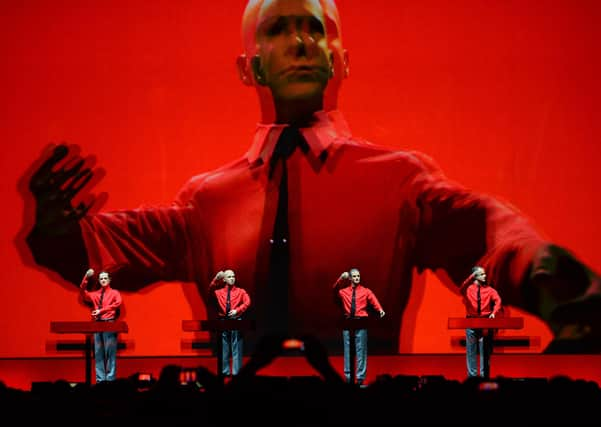Aidan Smith: Return of Bundesliga has got me thinking about my favourite Germans


Getting in the mood, I’ve been thinking a lot about my favourite Germans. Franz Beckenbauer, Gerd Muller, Gunther Netzer and – controversial – Stefan Effenberg. Also, Can, Faust, Amon Duul II, Tangerine Dream and – especially – Kraftwerk.
Football is returning. Not Scottish football or English football – goodness knows when we’ll see them again – but the Bundesliga. Some people seem underwhelmed. Despite Germany’s top league being as multicultural as any other, there’s a resistance to it. Critics – if they qualify for that position – fall back on tedious cliche: German football is too robotic. Just like Kraftwerk.
Advertisement
Hide AdAdvertisement
Hide AdKraftwerk founder member Florian Schneider died last week. He was the one who looked the most German. The most German German, indeed, since Helmut Haller, scorer of the opening goal in the 1966 World Cup final and the recipient of that boot up the jackside from Tam Gemmell three years later.
Schneider couldn’t help the way he looked, which admittedly was fairly sinister. Lester Bangs, the gonzo rock scribe, wrote of Schneider that he had the appearance of a man who could push a button and blow up half the world without blinking. You’d think Bangs had never forgotten the Second World War, but he was born a few years after it ended and he was also American.
Barry Davies, the commentator, once shrieked: “Where oh where were the Germans? But frankly, who cares?” Aged two when the war began, Davies was jingoistically excited about a goal scored by the Great Britain men’s hockey team. Fair enough. But there wouldn’t have been that second part to his exclamation if the opposition had been anyone else. It wouldn’t have meant the same.
Beating Germany has always been special to some – the English – and so has making fun of Germans or disregarding them. In 1975, when Bangs asked Kraftwerk if their electronic sounds represented a “final solution” for music, John Cleese was starring in what’s generally regarded as the greatest TV comedy of them all, a show best remembered for his goose-stepping.
The previous year West Germany were crowned the world’s football champs. That wasn’t a popular victory. Every neutral wanted Holland to win. Not me.
Why? I was young, so my appreciation of football’s finer points was still developing, but while I admired the Dutch, the fuss surrounding their total football seemed excessive. What could be more revolutionary, more total, when my school team’s coaches were insisting that defenders existed purely to defend, than Beckenbauer striding majestically forward?
I tried to play like Der Kaiser. The poster on my bedroom wall showed how to copy his “relaxed ankle”, where the initial speed of a pass would take it beyond opponents before slowing down for a team-mate to collect. “Fast, then not-so-fast? That’s normal velocity,” scoffed my father. But I still liked the Germans. Muller was a weebly-wobbly, borderline fat, striker similar to Scottish strikers. The Dutch were long-leggedly sexy and we had no one in our game like that.
The year ’75 was also notable for Autobahn, Kraftwerk’s chugging hymn to car travel. The band unnerved some. Where was the sweating drummer? Where was the guitarist wrestling his instrument like a python? And what was so great, anyway, about four guys standing completely still, expressionless apart from the occasional mad-professor leer from Schneider, while espousing the benefits of vorsprung durch technik?
Advertisement
Hide AdAdvertisement
Hide AdWell, Kraftwerk would go on to become as influential as the Beatles and the German national football team would go on to win two more World Cups and a couple of European Championships. They weren’t very rock ‘n’ roll, the cynics wailed, they’re too in thrall to efficiency. Being inefficient, though, is wetting your pants when the referee signals it’s the moment for a penalty shootout and, as history has shown, that doesn’t win you very much at all.
Efficient doesn’t mean safe and it doesn’t mean boring. Stefan Effenberg wasn’t called Stefan Efficient; he was more like Stefan Effin’-berg. Narcissistic, yes, but sometimes brilliant. I loved his stag ruts with Roy Keane in the Champions League. And it wasn’t very efficient of him to drive off in Brian Laudrup’s car without telling him.
Schneider was similarly crazy behind the wheel, plopping a bag of money on the counter to buy the same car as the German president then driving off at high speed and blowing it up.
Some – jealous of how Germany have coped with the pandemic – might be hoping their football blows up next weekend. Not me.
Comments
Want to join the conversation? Please or to comment on this article.
